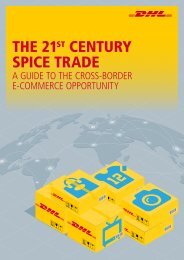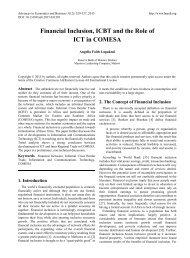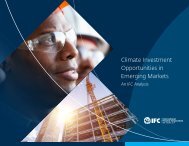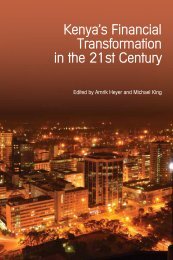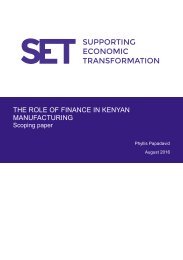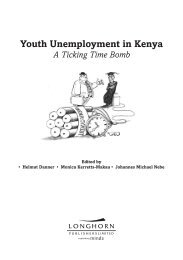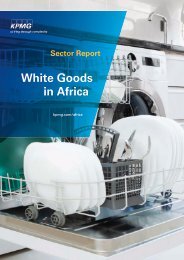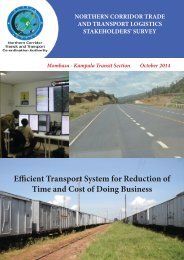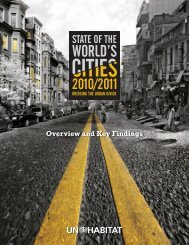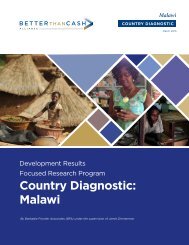FD
gvti301SEaf
gvti301SEaf
Create successful ePaper yourself
Turn your PDF publications into a flip-book with our unique Google optimized e-Paper software.
inequality engendered by financial openness and austerity<br />
might itself undercut growth, the very thing that the neoliberal<br />
agenda is intent on boosting. There is now strong<br />
evidence that inequality can significantly lower both the<br />
level and the durability of growth (Ostry, Berg, and Tsangarides,<br />
2014).<br />
The evidence of the economic damage from inequality<br />
suggests that policymakers should be more open to redistribution<br />
than they are. Of course, apart from redistribution,<br />
policies could be designed to mitigate some of the impacts<br />
in advance—for instance, through increased spending on<br />
education and training, which expands equality of opportunity<br />
(so-called predistribution policies). And fiscal consolidation<br />
strategies—when they are needed—could be<br />
designed to minimize the adverse impact on low-income<br />
groups. But in some cases, the untoward distributional<br />
consequences will have to be remedied after they occur<br />
by using taxes and government spending to redistribute<br />
income. Fortunately, the fear that such policies will themselves<br />
necessarily hurt growth is unfounded (Ostry, 2014).<br />
Finding the balance<br />
These findings suggest a need for a more nuanced view of<br />
what the neoliberal agenda is likely to be able to achieve. The<br />
IMF, which oversees the international monetary system, has<br />
been at the forefront of this reconsideration.<br />
For example, its former chief economist, Olivier Blanchard,<br />
said in 2010 that “what is needed in many advanced economies<br />
is a credible medium-term fiscal consolidation, not a<br />
fiscal noose today.” Three years later, IMF Managing Director<br />
Christine Lagarde said the institution believed that the<br />
U.S. Congress was right to raise the country’s debt ceiling<br />
“because the point is not to contract the economy by slashing<br />
spending brutally now as recovery is picking up.” And in<br />
2015 the IMF advised that countries in the euro area “with<br />
fiscal space should use it to support investment.”<br />
On capital account liberalization, the IMF’s view has also<br />
changed—from one that considered capital controls as almost<br />
always counterproductive to greater acceptance of controls<br />
to deal with the volatility of capital flows. The IMF also recognizes<br />
that full capital flow liberalization is not always an<br />
appropriate end-goal, and that further liberalization is more<br />
beneficial and less risky if countries have reached certain<br />
thresholds of financial and institutional development.<br />
Chile’s pioneering experience with neoliberalism received<br />
high praise from Nobel laureate Friedman, but many economists<br />
have now come around to the more nuanced view<br />
expressed by Columbia University professor Joseph Stiglitz<br />
(himself a Nobel laureate) that Chile “is an example of a<br />
success of combining markets with appropriate regulation”<br />
(2002). Stiglitz noted that in the early years of its move to<br />
neoliberalism, Chile imposed “controls on the inflows of<br />
capital, so they wouldn’t be inundated,” as, for example,<br />
the first Asian-crisis country, Thailand, was a decade and<br />
a half later. Chile’s experience (the country now eschews<br />
capital controls), and that of other countries, suggests that<br />
no fixed agenda delivers good outcomes for all countries for<br />
all times. Policymakers, and institutions like the IMF that<br />
advise them, must be guided not by faith, but by evidence of<br />
what has worked. ■<br />
Jonathan D. Ostry is a Deputy Director, Prakash Loungani is a<br />
Division Chief, and Davide Furceri is an Economist, all in the<br />
IMF’s Research Department.<br />
References:<br />
Baldacci, Emanuele, Iva Petrova, Nazim Belhocine, Gabriela Dobrescu,<br />
and Samah Mazraani, 2011, “Assessing Fiscal Stress,” IMF Working Paper<br />
11/100 (Washington: International Monetary Fund).<br />
Ball, Laurence, Davide Furceri, Daniel Leigh, and Prakash Loungani,<br />
2013, “The Distributional Effects of Fiscal Austerity,” UN-DESA Working<br />
Paper 129 (New York: United Nations).<br />
Dell’Ariccia, Giovanni, Julian di Giovanni, André Faria, M. Ayhan<br />
Kose, Paolo Mauro, Jonathan D. Ostry, Martin Schindler, and Marco<br />
Terrones, 2008, Reaping the Benefits of Financial Globalization, IMF<br />
Occasional Paper 264 (Washington: International Monetary Fund).<br />
Furceri, Davide, and Prakash Loungani, 2015, “Capital Account<br />
Liberalization and Inequality,” IMF Working Paper 15/243 (Washington:<br />
International Monetary Fund).<br />
Ghosh, Atish R., Jun I. Kim, Enrique G. Mendoza, Jonathan D. Ostry,<br />
and Mahvash S. Qureshi, 2013, “Fiscal Fatigue, Fiscal Space and Debt<br />
Sustainability in Advanced Economies,” Economic Journal, Vol. 123, No.<br />
566, pp. F4–F30.<br />
Ghosh, Atish R., Jonathan D. Ostry, and Mahvash S. Qureshi, 2016,<br />
“When Do Capital Inflow Surges End in Tears?” American Economic<br />
Review, Vol. 106, No. 5.<br />
Mendoza, Enrique G., and Jonathan D. Ostry, 2007, “International<br />
Evidence on Fiscal Solvency: Is Fiscal Policy ‘Responsible’?” Journal of<br />
Monetary Economics, Vol. 55, No. 6, pp. 1081–93.<br />
Obstfeld, Maurice, 1998, “The Global Capital Market: Benefactor or<br />
Menace?” Journal of Economic Perspectives, Vol. 12, No. 4, pp. 9–30.<br />
Ostry, Jonathan D., 2014, “We Do Not Have to Live with the Scourge of<br />
Inequality,” Financial Times, March 3.<br />
———, Andrew Berg, and Charalambos Tsangarides, 2014,<br />
“Redistribution, Inequality, and Growth,” IMF Staff Discussion Note 14/02<br />
(Washington: International Monetary Fund).<br />
Ostry, Jonathan D., Atish R. Ghosh, Marcos Chamon, and Mahvash S.<br />
Qureshi, 2012, “Tools for Managing Financial-Stability Risks from Capital<br />
Inflows,” Journal of International Economics, Vol. 88, No. 2, pp. 407–21.<br />
Ostry, Jonathan D., Atish R. Ghosh, Jun I. Kim, and Mahvash Qureshi,<br />
2010, “Fiscal Space,” IMF Staff Position Note 10/11 (Washington:<br />
International Monetary Fund).<br />
Ostry, Jonathan D., Atish R. Ghosh, and Raphael Espinoza, 2015,<br />
“When Should Public Debt Be Reduced?” IMF Staff Discussion Note 15/10<br />
(Washington: International Monetary Fund).<br />
Ostry, Jonathan D., Alessandro Prati, and Antonio Spilimbergo,<br />
2009, Structural Reforms and Economic Performance in Advanced<br />
and Developing Countries, IMF Occasional Paper 268 (Washington:<br />
International Monetary Fund).<br />
Rodrik, Dani, 1998, “Who Needs Capital-Account Convertibility?”<br />
in Should the IMF Pursue Capital-Account Convertibility? Essays in<br />
International Finance 207 (Princeton, New Jersey: Princeton University).<br />
Stiglitz, Joseph, 2002, “The Chilean Miracle: Combining Markets with<br />
Appropriate Reform,” Commanding Heights interview.<br />
Finance & Development June 2016 41



